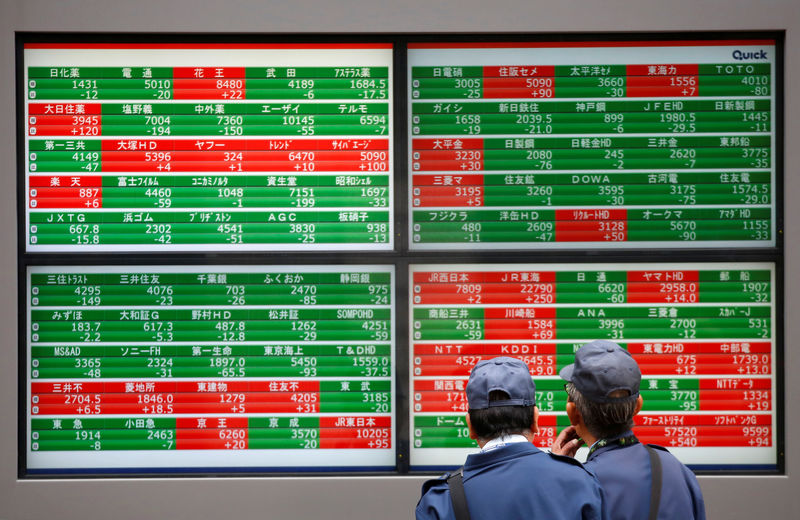By Trevor Hunnicutt
(Reuters) - Stocks and oil prices rebounded on Wednesday as the Trump administration attempted to shore up investor confidence and markets welcomed a report on strong U.S. holiday spending.
MSCI's gauge of stocks across the globe (MIWD00000PUS) gained 2.57 percent, while both U.S. (CLc1) and Brent crude (LCOc1) rose about 8 percent, their largest one-day increase since Nov. 30, 2016.
Benchmarks for both oil and stocks hit their lowest in more than a year on Monday, with the S&P 500 (SPX) on the cusp of being declared officially in a bear market during what is usually a calm week of trading shortened by the Christmas holiday. Markets in Britain, Germany and France were closed on Wednesday.
Kevin Hassett, chairman of the White House Council of Economic Advisers, said on Wednesday that U.S. Federal Reserve Chairman Jerome Powell's job was not in jeopardy. Just two days ago President Donald Trump described the Fed as the "only problem our economy has" as the central bank raises interest rates.
Investors have been unnerved by the potential for weaker economic growth and a partial U.S. federal government shutdown. Trump has largely laid the blame for economic headwinds on the Fed, openly criticizing a chairman he appointed.
U.S. Treasury Secretary Steven Mnuchin also raised market concerns by convening a crisis group following the sharp pullback in stocks.
One economist said the Fed holds the key to calming markets.
"In the end, we believe that the Fed is the only presence capable of ending the current confusion in the markets," Kenta Inoue, senior market economist at Mitsubishi UFJ Morgan Stanley (NYSE:MS) Securities, said in a note. "The White House will probably keep making gestures intended to halt the rout in stocks, but the federal government is likely to remain shut into the new year. The U.S.-China trade war also shows no signs of a resolution."
A Mastercard (NYSE:MA) Inc report that sales during the U.S. holiday shopping season rose 5.1 percent to over $850 billion in 2018, the strongest in the past six years, helped stocks, as did the higher crude prices. Investors also often sell assets that have done the best and buy those that have done the worst at the end of the quarter to "rebalance" to a target position.
The Dow Jones Industrial Average (DJI) rose 1,086.25 points, or 4.98 percent, to 22,878.45, the S&P 500 (SPX) gained 116.6 points, or 4.96 percent, to 2,467.7 and the Nasdaq Composite (IXIC) added 361.44 points, or 5.84 percent, to 6,554.36.
U.S. government bonds, a beneficiary of the risk-off move in recent weeks, fell in price on Wednesday. Bonds maturing well into the future and sensitive to inflation and risk sentiment declined faster than short-term debts more influenced by Fed policy. Benchmark 2-year Treasuries (US2YT=RR) fell 2/32 in price to yield 2.6251 percent, while the 30-year bond (US30YT=RR) declined 1-9/32 in price to yield 3.0653 percent.
"Breathe on these markets and corrective rebounds could ensue," Citigroup Inc (NYSE:C) analysts Bill O'Donnell and Ed Acton said in a note, as investors react to a Fed tightening policy and rising rates. "We think we'll recognise the signs when sustainable trend reversals have been established and at the moment we see none of those signs."
Meanwhile, a risk-off move that lifted the Japanese yen for eight straight trading sessions against the U.S. dollar lost steam. The yen

Gold hit six-month highs but withered as the stock rally charged on. Spot prices in the metal